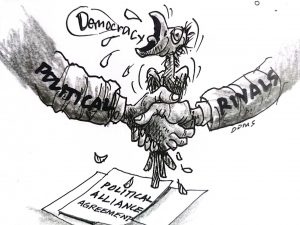There’s something oddly comical when two rival political giants suddenly decide to join forces, divvying up the positions they once fought tooth and nail to win. It’s like watching the climax of a long-running soap opera where enemies become best friends overnight. But this newfound camaraderie isn’t exactly heartwarming—it’s rather concerning than anything. The spirit of competition, the very foundation of democracy, is tossed aside in favor of mutual self-interest, leaving voters with no choice but to accept the hand they’ve been dealt.
What makes it even funnier, or rather sad, is that the fierce campaigns we expect to see are replaced with awkward silence. Instead of fiery debates and passionate speeches, we get an eerie calm, as if the game was rigged before it even began. The candidates—now unopposed—waltz into their “juicy” positions without breaking a sweat, and the voters are left out of the equation. What used to be a battleground of ideas turns into a bland, one-sided affair, with no one to challenge the status quo or even ask tough questions.
This strange alliance strips away any pretense of serving the people. It’s not about who’s the best person for the job anymore; it’s about who can secure the spoils of office with the least amount of hassle. Political rivalry, for all its faults, at least offers voters a choice, a chance to weigh their options and decide who aligns more with their vision of progress. When that rivalry is artificially ended through backroom deals, we’re no longer witnessing democracy in action. We’re just spectators to a puppet show where all the strings are being pulled from behind the scenes.
What’s even more troubling is the precedent this sets for future elections. If this kind of collusion goes unchallenged, we might as well forget about competitive elections altogether. Why bother fielding a candidate when the major players can just split the pot between themselves? It’s a slippery slope that leads to stagnation, where innovation, progress, and genuine public service are sacrificed in the name of convenience. The absence of worthy opponents creates a political landscape where mediocrity thrives because there’s simply no one to push for something better.
In the end, this political détente serves no one but the politicians themselves. If we want to avoid this farce becoming the norm, voters need to demand accountability and transparency. Leaders should earn their positions through competition, not cozy backroom deals. Only then can we restore the integrity of the electoral process and ensure that our choices, as voters, matter.




